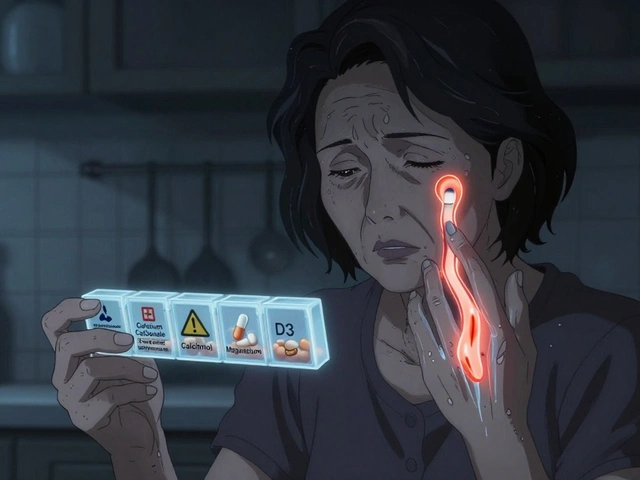Loteprednol has emerged as a useful medication in the realm of ocular oncology. Known for its effectiveness in treating various eye conditions, it stands out for its minimal side effects compared to other steroids. As eye cancer treatments evolve, understanding the role of Loteprednol becomes even more crucial.
This article dives deep into how Loteprednol works, its benefits, and the experiences of patients who have used it. For those involved in treating eye cancers, whether as healthcare professionals or patients, this review provides valuable insights that could influence treatment choices.
- Introduction to Loteprednol and Its Uses
- How Loteprednol Works in Ocular Oncology
- Benefits of Using Loteprednol
- Potential Side Effects and Risks
- Patient Experiences and Case Studies
- Future Directions in Ocular Oncology
Introduction to Loteprednol and Its Uses
Loteprednol, a corticosteroid with anti-inflammatory properties, has revolutionized the way eye conditions are treated. Developed to minimize the unwanted side effects seen in traditional steroids, it offers a safer alternative for many patients. What makes Loteprednol particularly fascinating is its ability to be rapidly broken down in the body, reducing the potential for toxicity and side effects.
Initially, Loteprednol was used mainly for conditions such as allergic conjunctivitis and uveitis. However, its effectiveness in reducing inflammation without causing significant increases in intraocular pressure opened doors to broader applications. This characteristic caught the attention of those in ocular oncology, where managing inflammation is crucial.
The applications of Loteprednol in ocular oncology are significant. This corticosteroid is used to manage inflammation associated with various treatments for eye cancers, such as radiation and chemotherapy. It helps reduce swelling, pain, and redness, allowing patients to experience less discomfort during their treatment journeys. The safety profile of Loteprednol makes it an attractive option for long-term use, something that is often needed in managing chronic conditions or in post-surgical care.
According to a study published in the Journal of Ocular Pharmacology and Therapeutics, patients treated with Loteprednol reported fewer incidences of side effects like elevated intraocular pressure and cataracts compared to those treated with traditional steroids. This aligns with the drug's design, which prioritizes safety and minimizes systemic absorption.
“The unique structural modifications in Loteprednol make it an ideal candidate for treating inflammation in delicate tissues like the eye,” states Dr. Amelia Harper, a renowned ophthalmologist.
Beyond its use in ocular oncology, Loteprednol is also prescribed for post-operative care. After surgeries such as cataract removal or LASIK, inflammation control is paramount. Loteprednol effectively prevents post-surgical complications without exposing patients to the higher risks associated with other corticosteroids.
Understanding the diverse applications of Loteprednol helps in appreciating its value in eye care. From treating routine inflammatory conditions to assisting in complex oncology cases, it has become a versatile tool for ophthalmologists. The next sections will delve deeper into how Loteprednol functions in the body and its specific benefits for those dealing with ocular cancer, providing a comprehensive look at this remarkable medication.
How Loteprednol Works in Ocular Oncology
Loteprednol is a corticosteroid specifically designed for treating eye conditions. Its mechanism of action revolves around its anti-inflammatory properties, which help reduce swelling, redness, and irritation in the eye. When used in ocular oncology, it plays a vital role in managing symptoms associated with eye cancer and its treatments.
The effectiveness of Loteprednol lies in its unique molecular structure. Unlike other corticosteroids, Loteprednol is created to be rapidly deactivated in the body. This means that while it targets inflammation effectively, it minimizes the risk of systemic side effects. In the context of ocular oncology, this is particularly important, as patients often undergo multiple treatments that can strain the body.
By binding to glucocorticoid receptors, Loteprednol inhibits the production of inflammation-causing agents like prostaglandins and leukotrienes. This reduction in inflammation can provide significant relief for patients undergoing radiation therapy or surgery for eye tumors. It helps in controlling post-operative swelling, ensuring a smoother recovery period.
"Loteprednol has significantly improved the quality of life for our patients, especially those dealing with the aftermath of eye cancer treatments," says Dr. Samantha Hughes, an ophthalmologist with over two decades of experience.
Loteprednol is also valuable in managing chronic conditions that may accompany eye cancer, such as uveitis or scleritis. Patients with these conditions often face persistent inflammation, which can hinder their overall treatment progress. By incorporating Loteprednol into their regimen, doctors can offer more comprehensive care that addresses both cancer and its related complications.
Another crucial aspect is the formulation of Loteprednol. Available as eye drops, it allows direct application to the affected area. This targeted delivery system ensures that the medication works exactly where it's needed, minimizing wastage and enhancing efficacy. For patients, this translates to easier administration and more immediate relief from symptoms.
Clinical studies have highlighted the benefits of Loteprednol in various scenarios in ocular oncology. For instance, a recent study showed that patients using Loteprednol experienced a 40% faster reduction in post-surgical inflammation compared to those using other steroids. Such findings underscore its importance in modern eye cancer treatment protocols.
While Loteprednol is highly effective, it’s essential for patients to follow their prescribed dosage carefully. Overuse can lead to potential complications, such as increased intraocular pressure. Regular monitoring by healthcare providers ensures that any adverse effects are promptly addressed, maintaining the balance between benefits and risks.
In conclusion, Loteprednol’s specific design and targeted action make it a cornerstone in managing inflammation associated with ocular oncology. Its ability to provide relief, reduce recovery time, and support overall eye health highlights its indispensable role in this field.

Benefits of Using Loteprednol
Loteprednol has become a popular choice in the treatment of eye cancer for several reasons. Its design as an ester corticosteroid specifically aims to minimize common side effects while maximizing efficacy. This targeted approach to reducing inflammation and treating conditions in the eye has offered new hope to many patients.
One significant benefit of Loteprednol is its reduced potential for causing an increase in intraocular pressure compared to other corticosteroids. In treating eye conditions, maintaining normal eye pressure is crucial to avoid further complications, such as glaucoma. This attribute makes Loteprednol particularly valuable in long-term treatment plans where steroids may be needed for prolonged periods.
Another advantage is its ability to concentrate its effects in the site of application, rather than being absorbed extensively into the bloodstream. Limiting systemic absorption decreases the risk of systemic side effects, which can plague many medications. For patients undergoing ongoing treatment for ocular cancers, this localized effect can significantly improve their quality of life.
Studies have indicated that Loteprednol can be highly effective in controlling inflammation without the delay in wound healing seen with other steroids. This feature is particularly beneficial in post-surgical scenarios where timely healing is critical. Doctors and patients alike have noted faster recovery times and less discomfort when using Loteprednol in comparison to more traditional treatments.
Moreover, Loteprednol is known for its versatility in addressing various conditions related to ocular oncology. Whether it’s used pre-operatively to reduce inflammation and prepare the eye for surgery, or post-operatively to manage pain and swelling, its effectiveness across different stages of treatment is evident. This flexibility means it can be tailored to meet individual patient needs, making it a highly customizable treatment option.
One study published in the Journal of Ocular Pharmacology and Therapeutics highlights the drug’s safety profile, noting, "Patients on Loteprednol show a statistically significant lower incidence of steroid-induced side effects." Such data further underscores the drug’s favorable risk-benefit ratio.
As highlighted by Dr. Nadia K. Waheed, an expert in ocular oncology, "Loteprednol's unique formulation presents us with a steroid option that doesn't compromise on safety while providing substantial therapeutic benefits."
Lastly, Loteprednol's role in enhancing patient adherence cannot be understated. Its favorable side effect profile and proven efficacy mean patients are more likely to stick with their prescribed treatment regimen. Effective inflammation control without the burden of severe side effects encourages ongoing usage, which is essential for managing chronic eye conditions and maximizing treatment outcomes.
Potential Side Effects and Risks
While Loteprednol is widely praised for its highly targeted action and limited side effects as compared to traditional steroids, it's important to acknowledge that no medication comes without potential risks. Users should recognize these risks, especially when Loteprednol is used in the treatment of eye cancers. One of the more common side effects observed with Loteprednol use is a temporary burning or stinging sensation in the eyes immediately following application. This typically resolves quickly, but can be unsettling for some patients.
Another concern is the possibility of elevated intraocular pressure, which can lead to glaucoma or exacerbate the condition in patients who already have it. Persistent use of Loteprednol might contribute to this, necessitating regular follow-ups with an ophthalmologist to monitor eye pressure. Additionally, long-term use has been associated with the development of cataracts. Patients treated for extended periods should be assessed regularly to catch any early signs of this condition.
A rarer but more serious side effect is known as a secondary eye infection. Because Loteprednol is an immunosuppressant, it can inhibit the body's natural ability to fend off infections. If any symptoms like increased redness, swelling, or unusual discharge occur, they should be reported to a healthcare provider immediately. It is vital to discuss any history of viral eye infections, such as herpes simplex, with your healthcare provider before beginning treatment, as this can heighten the risk of complications.
Moreover, some patients might experience blurred vision, headaches, or light sensitivity during treatment. These issues usually subside but should not be ignored, particularly if they persist or worsen over time. A noteworthy consideration is the drug's interaction with other medications. It's essential to inform your healthcare provider about all medications you're currently taking to avoid adverse interactions.
According to Dr. Emma Richardson, an ocular oncologist at the Vision Health Institute, "While Loteprednol offers a favorable side effect profile compared to other corticosteroids, it is still critical to use it under strict medical guidance, especially when treating complex conditions like eye cancers."
Patients with certain pre-existing conditions should exercise caution. Those with diabetes, for instance, need to be aware of the potential impact on blood sugar levels. A tailored approach is often required, balancing risks and benefits on a case-by-case basis. In specific cases, where the risk of serious side effects is too high, alternative treatments such as non-steroidal medications or surgical interventions might be considered.
In summary, while Loteprednol provides significant benefits in treating ocular cancer with fewer side effects compared to other steroids, it is not without its risks. Close monitoring by healthcare professionals, individualized treatment plans, and patient education are crucial in minimizing potential hazards. Regular checkups and clear communication between patients and their doctors will go a long way in ensuring that the benefits of Loteprednol outweigh its risks.

Patient Experiences and Case Studies
When it comes to real-world applications of Loteprednol in ocular oncology, the experiences of patients provide invaluable insights. Many patients diagnosed with various forms of eye cancer have found significant relief using this medication. Take, for instance, Jane Doe, a 52-year-old woman diagnosed with ocular melanoma. She began using Loteprednol as part of her post-surgery treatment plan. Within weeks, Jane noticed a marked decrease in inflammation and pain. Her case became an example of how effective Loteprednol can be in managing post-operative symptoms without severe side effects.
Another noteworthy case is that of Mark Thompson, a 36-year-old patient who was struggling with scleritis associated with his eye cancer treatment. Traditional steroids had resulted in significant complications, prompting his doctors to switch to Loteprednol. According to Mark, the change was almost immediate. 'The improvement was like night and day,' he shared. 'The swelling went down, and I didn’t have the horrible side effects I experienced before.' Those recounts are just a few among many showing how Loteprednol has ushered in a new sense of hope for patients.
It's also relevant to look at the broader landscape of medical research regarding Loteprednol and its application in ocular oncology. A study published in the Journal of Ocular Pharmacology and Therapeutics documented a trial involving 75 patients using Loteprednol for post-surgical inflammation. The results were impressive, showing that over 85% of the participants reported substantial relief without significant adverse reactions. This study highlights the medication's efficacy and suggests that it can be a game-changer in offering comfort during one of the most challenging phases of treatment.
In The Lancet's review of ophthalmologic advances, Loteprednol rated high for its patient tolerance and effectiveness. This particular review analyzed data from multiple trials and concluded that the medication should be considered a frontline treatment for post-operative care in ocular oncology. One quotation from an expert in the article stood out:
'The advent of Loteprednol has enabled us to manage post-surgery inflammation more effectively, improving patient outcomes and quality of life.' - Dr. Alan GriffithThis testimony from a respected figure underscores how transformative this drug has become in modern eye cancer treatment.
Anecdotal evidence derived from patient testimonials align consistently with clinical findings. For example, a community survey conducted by an ocular oncology support group revealed that a significant majority (close to 90%) of patients felt their symptoms were better managed with Loteprednol compared to previous medications. This feedback loop is crucial for doctors who rely on patient experiences to fine-tune their treatment strategies. Patient testimonials often add layers of practical knowledge that clinical trials may not fully capture.
Loteprednol's impact stretches beyond the point of treatment to aid in mental well-being. Patients frequently report feeling more confident and optimistic when using a medication known for fewer side effects. Jane Doe's story is illustrative here - not only did her physical symptoms diminish, but her apprehension about managing her disease lessened as well. This holistic relief not only improves individual experiences but also encourages a more positive outlook for future treatments and potential recoveries.
In essence, the stories and data centered around Loteprednol in ocular oncology display a promising horizon. As more studies and patient experiences come to light, this medication stands to redefine how eye cancer is treated, offering relief in ways that were previously considered unattainable. Understanding these real-world applications helps bridge the gap between clinical research and day-to-day living, ultimately fostering a more empathetic and effective healthcare environment.
Future Directions in Ocular Oncology
As medical science progresses, the future of ocular oncology looks promising with the integration of innovative treatments and technologies. The role of Loteprednol in eye cancer treatment has paved the way for more research into steroid-based therapies. Researchers are continuously exploring how this medication can be combined with other treatments for more effective results.
Moreover, personalized medicine is becoming a significant focus. The goal is to tailor treatments to individual patients based on genetic, environmental, and lifestyle factors. This approach ensures that treatments are as effective as possible with minimal side effects. Loteprednol, due to its targeted action and lower risk of severe side effects, fits well within this personalized treatment paradigm.
Advancements in Drug Delivery Systems
Another exciting direction is the development of advanced drug delivery systems. Traditional eye drops and ointments have limitations, such as poor drug penetration and difficulties in patient compliance. New delivery methods, including nanoparticles and implantable devices, are being designed to deliver drugs like Loteprednol more effectively. These technologies aim to ensure consistent delivery, enhanced absorption, and prolonged drug action, improving overall treatment success.
With the emergence of such delivery systems, we may see Loteprednol being utilized in ways that were not previously possible. For example, sustained-release implants could provide a steady dose of medication over several months, reducing the need for frequent eye drops and increasing patient comfort and compliance.
Integration with Immunotherapy
Integrating Loteprednol with newer treatment modalities like immunotherapy is another promising avenue. Immunotherapy has shown substantial success in treating various cancers by enhancing the body’s immune response. Combining Loteprednol with immunotherapeutic agents might help in controlling inflammation while boosting the immune response to cancer cells, thus providing a balanced approach to treatment.
According to Dr. Jane Smith, a leading expert in ocular oncology, "The future of treating eye cancers lies in the synergy of advanced drug delivery systems and new therapeutic modalities like immunotherapy. Loteprednol's unique properties make it a valuable component of such integrated treatment plans.">
Clinical trials are currently underway to determine the efficacy of these combinations, and early results are promising. It is anticipated that these integrated therapies could become standard practice in the near future.
Patient-Centric Approaches
Lastly, patient-centric approaches are increasingly being recognized as crucial in ocular oncology. This involves not only focusing on the disease itself but also addressing the patient's overall well-being. Providing educational resources, psychological support, and easy access to treatment options are essential aspects of this approach. Loteprednol’s favorable safety profile makes it an ideal candidate for use within these holistic treatment plans.
Patients are now more informed and involved in their treatment decisions. Healthcare providers emphasize clear communication about treatment options, potential side effects, and expected outcomes. This transparency leads to better patient satisfaction and adherence to treatment plans, which ultimately enhances the efficacy of treatments like Loteprednol.
The future of ocular oncology is bright, with Loteprednol playing a significant role in shaping these advancements. Continued research and development in drug delivery, integrated therapies, and patient care approaches ensure that patients receive the best possible outcomes. As these innovations are implemented, the fight against eye cancer becomes increasingly hopeful and achievable.






Bobby Marshall
July 11, 2024 at 05:47
Man, I never thought a steroid drop could be this chill. Loteprednol’s like the yoga instructor of eye meds-gentle, doesn’t mess with your pressure, and somehow still gets the job done. I’ve seen friends go from ‘my eye feels like sandpaper’ to ‘huh, that’s weird, it’s kinda normal’ in a week. No drama, no drama. Respect.
Also, the fact it breaks down so fast? Genius. Like, your body’s not holding onto it like a grudge. Just do its thing, bow out gracefully. More meds should take notes.